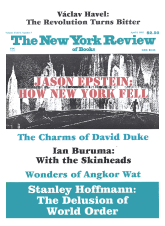In response to:
Lawrence in Love from the February 13, 1992 issue
To the Editors:
At the beginning of his absorbing review of a new biography of D.H. Lawrence [“Lawrence in Love,” NYR, February 13], David Lodge writes:
the conclusion that “all biography is ultimately fiction” is one with which most contemporary theorists of literature would concur. It is a poststructuralist commonplace that language constructs the reality it seems merely to refer to; therefore all texts are fictions…. Even in the groves of academe, however, a distinction between empirical and fictional narrative stubbornly persists. Granted that any interpretation is partial, subjective, and open to revision—therefore a kind of “fiction”—nevertheless there is a difference, many would argue, between facts that are recovered by historical research, and “facts” that are invented by the creative imagination.
It is not clear where Lodge stands in all this. The phrases “stubbornly persists” and “many would argue” suggest that Lodge may regard as stragglers in the rear guard of literary studies those who have difficulty believing that “language constructs the reality it seems merely to refer to,” and obstinately cling to the conviction that there is a real difference between, for example, my declaring, “I was born of immigrant parents at Lincoln Hospital in the Bronx” (a statement supported by some yellowing documents), and my asserting, “I was born in the Devonshire castle of my father, the Prince of Wales, by his mistress, an indigent Russian princess,” which, I insist, once and for all, is a fabrication. Whether Lodge is merely showing that he is up on the latest frivolities from academe (which no one familiar with his hilarious novels has ever doubted), being ironic, or means seriously to “put in question” the distinction between fact and fiction (accepted by all sane people, with the exception of some literary theorists), he then goes on for several thousand words to discuss in minute detail Lawrence’s life, lovers, wife, and sundry escapades, as known from letters, journals, newspaper reports, and the like, in a way typical of such discussions over the past two hundred years—but for the frank sexual detail—meanwhile ignoring altogether that a “theoretical” question about fact and fiction exists. What this demonstrates, once again, is the immense gulf between what some intellectuals profess to believe as theorists, and what they actually believe as demonstrated by the way they read and talk about fiction and non-fiction, and write book reviews for rational audiences.
Norman Fruman
Department of English
University of Minnesota
Minneapolis, Minnesota
David Lodge replies:
I am sorry that I did not make clear to Professor Fruman where I stand in this matter—which is, of course, firmly on the fence, like any good liberal. I entirely agree with him that there is a meaningful distinction to be made between facts and fictions, and any irony in my “stubbornly” was directed at those who deny this. On the other hand, it seems to me equally obvious that as soon as “facts” are articulated in a discourse, interpretation begins, and an interpretation is a kind of fiction (not to be confused with a falsehood). Professor Fruman’s birth is an empirically verifiable fact, but his verbal description of it is necessarily selective, privileging some of its aspects, excluding others. It seems to me legitimate to say that in this sense “language constructs the reality it seems merely to refer to.” Biographers and historians are not immune from this condition of human thought because they try to work exclusively with empirically verifiable facts. Nor does acknowledging it preclude one’s enjoyment of, and engagement with, the products of that work.
This Issue
April 9, 1992



